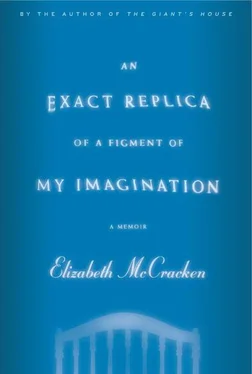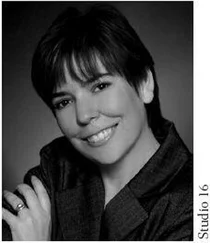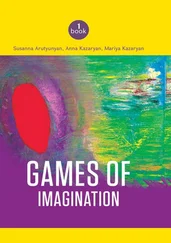If you’d asked me five years ago — let’s say five years ago and seven weeks — where I saw myself, five years and seven weeks in the future, I would not have mentioned a husband, children, living in six different countries. I was thirty-five and had never had a really serious romance. This mostly didn’t bother me. I liked living alone. I even liked going to movies alone and eating in restaurants alone. I would never have called myself single. The word suggests a certain willingness to flirt in bars or take out advertisements for oneself on the Internet: single people are social in the hope that they won’t be single forever. I was a spinster, a woman no one imagined marrying. That suited me. I would be the weird aunt, the oddball friend who bought the great presents and occasionally drank too much and fell asleep on the sofa. Actually, I already was that person.
Then I went to a party in New York thrown by Barnes and Noble and discovered that the author of that weird illustrated book I’d liked so much was not, as I’d concluded from the work and author photo, a midforties, balding, puffy misanthrope, but a cheerful, floppy-haired thirtyish Englishman. A month later, he came to Boston to work on an art project and called me up. We went out every night for a week. On our third date, he said, “I have something to tell you.” It transpired that his name was not, as was printed on his book, Edward Carey, but in fact, as was printed on his passport, Jonathan Edward Carey Harvey. He displayed the passport to prove this. As revelations went, I could live with it, though it was too late for me to call him anything but Edward. At the end of the week, on our fifth date — which happened to be his thirty-second birthday — he asked me very seriously if I wanted children.
The only other people who’d asked me that question were my similarly aging childless girlfriends. The answer I generally gave was: not abstractly, but if I met someone who really wanted children, and I thought he’d be a good father, and I was relatively sure we’d be married forever or at least for the length of two roughly concurrent childhoods, then yes, I would want children, yes please. I loved family life, adored my parents and my older brother, our decades-old running jokes, our familial obsessions. We went out for long, boozy meals. We took trips together and brought home souvenirs and outlandish stories. The McCracken Family Circus. We even went to the actual circus together, all four of us being actual circus buffs. Yes: I would want children if I met someone with whom I could imagine raising eccentric, friendly, hilarious children who we could bundle off to Europe and museums and circuses no matter how old or young they were. At thirty-five it seemed unlikely I’d meet such a person. That was OK. If life never brought me a husband or children, I wouldn’t miss them. I’d devote myself to good works or bad habits.
But I could tell that Edward wasn’t asking idly. He has a wide forehead upon which all emotions are legible: sincerity, anxiety, apprehension, skepticism; he has passed it down to our sincere, apprehensive, occasionally skeptical second baby. My answer would make a difference.
“Yes,” I said. “I think I would.”
A week after that — it has been five years and seven weeks, Mother, and I no longer feel the need to juggle the ledgers — he moved into my apartment. When people ask where we met, I sometimes say, “I ordered him from Barnes and Noble.”
I’d lived for nine years in Somerville, Massachusetts: now Edward and I began to move. For four years, we relocated every few months, to Iowa City, Paris, Ireland, Iowa City, Berlin, small-town Denmark, Iowa City, Paris. We chased jobs and fellowships and wine and museums, lived in midwestern sabbatical sublets, a thatched cottage that had sheltered Brecht in the 1930s, next door to hard-partying students, in a German villa made over into housing for American academics. Somewhere in there we got married at the small stone church at the bottom of Edward’s parents’ driveway. The village vicar officiated, backed up by an American rabbi my mother had ordered off the Internet.
My favorite of our dwellings was our last apartment in Paris, the first home of my first pregnancy. We’d had a list of things we wanted in a place to live: space for two desks, maybe a guest room, maybe a tiny balcony, without a doubt an elevator for certain unsteady relatives. Then we answered an ad in an expat paper. The building was next to the Jewish Museum and around the corner from the Pompidou Centre. We punched the code we’d been given over the phone into the pad by the door, walked five flights of stairs that got narrower and wobblier until we were at the top in a low-ceilinged hallway, rang a bell, and were let into a seventeenth-century high-ceilinged cartoon garret filled with antique furniture. It fulfilled none of our requirements. We loved it immediately. Just then another would be renter showed up, a yellow-clad lawyer from Boston, with wooden skin and leaden hair and the official dreary insinuating underfed brittle aura of a number 2 pencil. We understood that she meant us ill. “We’ll take it,” Edward told the landlady, a tall woman from Amiens who raised mules and taught English to small boys. “Wonderful,” the landlady answered, and the lawyer said in disbelief, “It’s fine for one person. But two?”
“We’re writers,” I said apologetically. “We’re supposed to live in a garret in Paris.”
She snorted. “ Everyone in Paris is a writer.”
The kitchen was small and overlooked the dining area; the guest room was a treacherous loft over the living room; the tub was a slipper bath, half-sized but deep, with a step to sit on, the perfect place to read. Above the bed, where I worked, sitting up, was a ceiling of herringbone beams. Through the bedroom window you could see the turrets of the National Archives; through the dining room window, the chimney pots of Paris.
I was working on a malingering novel, since abandoned (for a while I said, “It died,” but not anymore), and Edward on an enormous one. We’d write in the morning, Edward in the dining room and me propped up in bed, and then I’d persuade him to go out to lunch, where we’d order a carafe of wine, and then we’d wander and spend money and not get back to our books till the next morning.
After some months of this, my novel collapsed. I panicked: How would I ever write again? How could we afford to keep living in Paris at this rate? To talk me down from the cliff, Edward suggested the country, where life would be beautiful, cheap, and dull, and we’d have no choice but to work. All right, I said. We found three possible properties on the Internet; we drove out to look at them. The first was a millhouse that had been converted into a restaurant and was now being converted back into a house; from the windows we could see the landlord’s apartment, which seemed overly cozy. The second, also a millhouse, had an intermittent rat problem. “Coypou,” the landlady explained, and Edward said, “Oh, coypou,” as though this constituted a particularly prestigious sort of rat problem. The third was Savary. Beryl, the landlady, showed us around. Preposterous! we thought. Who needed four times as many toilets as occupants? But the price was right, and we signed a lease that started in three months, and we went back to Paris.
Two weeks later, I sent Edward out to negotiate a pregnancy test. All slightly medical transactions in French pharmacies require negotiation with the pharmacist. I took it, disbelieved it, sent him out for another, which agreed with the first.
We didn’t call my occupant the Baby, which seemed inaccurate, cloying, and too optimistic. We were superstitious. For some complicated, funny-only-to-the-progenitors reason, we settled on the names Pudding and Wen (in case we were having twins, which, as the daughter of a twin, I worried about). Then the first ultrasound showed the single pocket-watch heart, and so it was just Pudding, boy or girl. What’s Pudding doing? How are you, Pudding? The baby ticking away was Pudding all September in Paris, and Pudding when we moved to the countryside in October. And then we had the amnio, and Pudding seemed to suit a little boy, the little boy we were making up day by day — I made him up literally, of course, cell by cell and gram by gram, and Edward and I made him up in conversation and dumb flights of fancy. Pudding! we’d say to my stomach. Pudding, what are you up to? Pudding was Pudding to us and soon enough to all our friends and family: everyone called him that. I couldn’t imagine naming a baby ahead of time, calling a baby by his earth name before he was a citizen of this world. Naming seemed a kind of passport stamp.
Читать дальше












